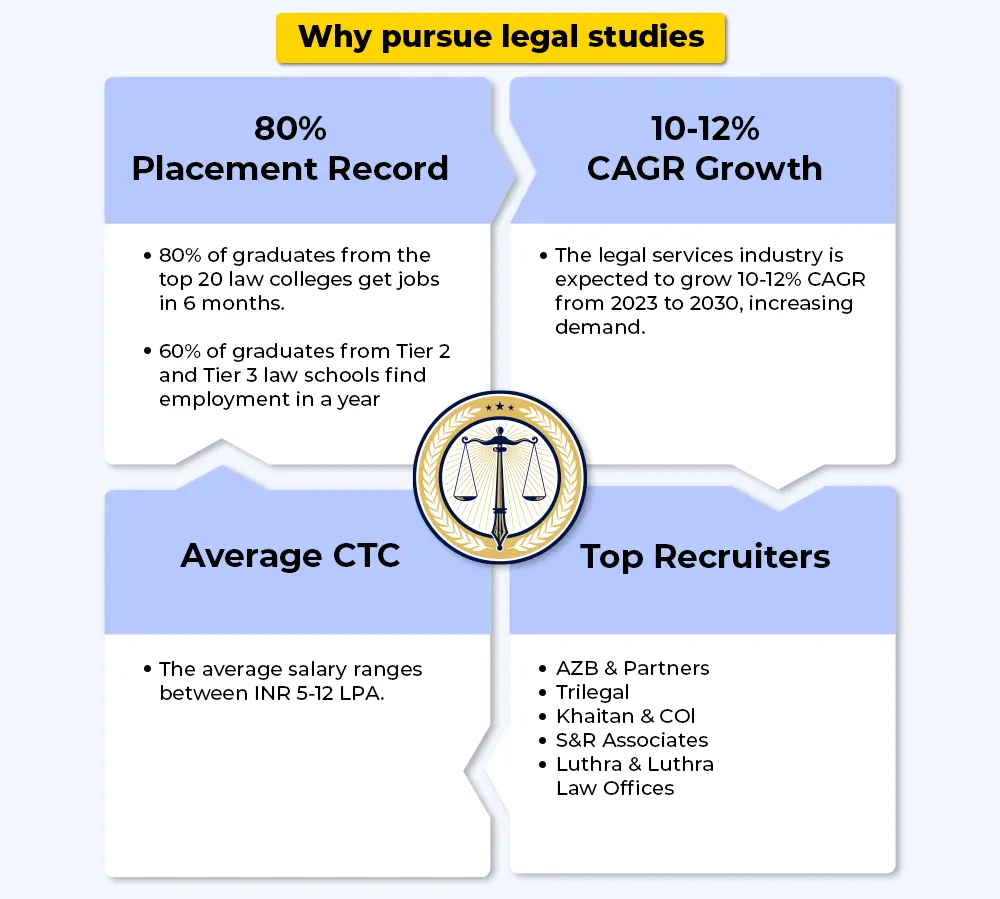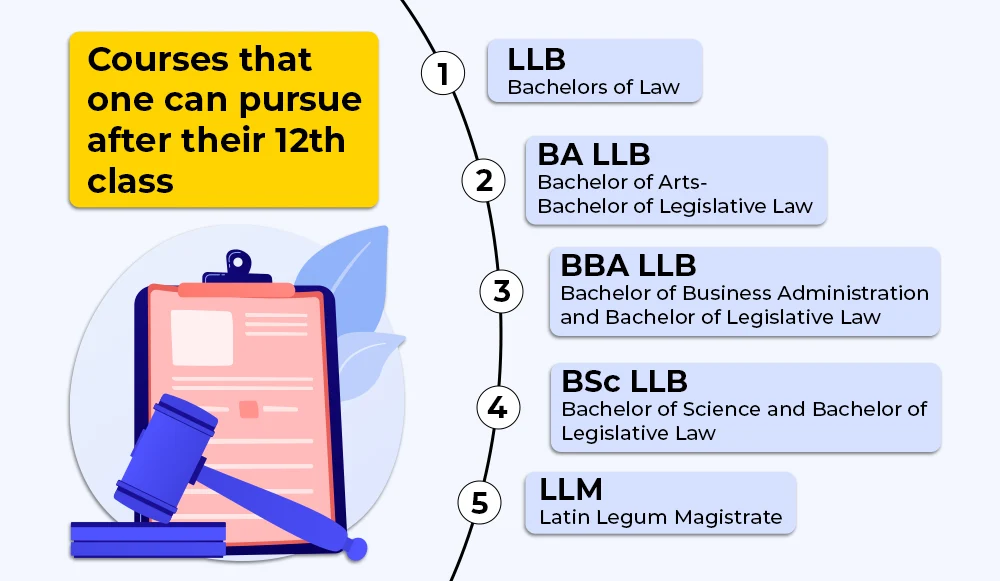Expert Interviews
- University Reviews
- Career Guide
 Video Counseling
Video CounselingImportant Facts
- Ask any Question - CV Forum

Why Legal Studies? Overview, Career Scope & Salary Details
Sonika Jul 21, 2025 1.1K Reads

Don’t give a second thought about this. Your brain has already given you an idea, that’s why you are thinking about it. To be in a law sector or judiciary is one of the best options for law enthusiasts, without interest, no one can achieve the goal of completing the course and earning a handsome salary. Let’s learn about legal studies - its overview, scope, and salary details.

What are legal studies?
Legal studies is an academic area that explores the principles, systems, and functions of laws in society. It examines how legal guidelines and rules are made, interpreted, and enforced, and delves into topics like constitutional law, criminal justice, human rights, and legal theory. Unlike a conventional regulation degree targeted at practicing law, law studies presents a broader knowledge of legal studies and structures and their social, political, and financial impacts.
For people who are interested in the intersection of regulation and society, this discipline is perfect. It serves as an entry point to law faculty or establishes the groundwork for professions in governance, compliance, public coverage, and regulation enforcement.
Why pursue legal studies?
A thorough grasp of how the laws impact justice and form society may be received by pursuing legal studies. It offers students research, communication, and critical thinking skills that are beneficial in lots of fields. Legal studies offer a variety of big employment paths, whether or not one chooses to pursue a career in law or positions in authority, policy, or business.

80% Placement Record
- 80% of graduates from the top 20 law colleges get jobs in 6 months.
- 60% of graduates from Tier 2 and Tier 3 law schools find employment in a year
10-12% CAGR Growth
The legal services industry is expected to grow 10-12% CAGR from 2023 to 2030, increasing demand.
Average CTC
The average salary ranges between INR 5-12 LPA.
Top Recruiters
- AZB & Partners
- Trilegal
- Khaitan & COl
- S&R Associates
- Luthra & Luthra Law
Offices
- Numerous Career Paths: Legal studies can lead to positions in public service, business compliance, policymaking, law, and media.
- Social Impact: Gives people the ability to comprehend and impact legal reform and social justice.
- Personal Empowerment: Being aware of the law enables people to navigate and defend their rights in day-to-day situations.
- Strong Skill Development: Develops persuasive communication, legal research, and analytical thinking abilities.
- Global Relevance: Legal knowledge is becoming more and more important in human rights, international business, and diplomacy.
- Gateway to Law School: Provides a solid basis for individuals who aspire to practice law or serve as judges.
- Critical for modern professions: Legal knowledge is essential for modern professions in fields including technology, healthcare, finance, and environmental policy.
Who should pursue legal studies?
For those who are enthusiastic about justice, equity, and advocacy and who are interested in how laws shape society, legal studies is the perfect course of study. It is appropriate for people who are very analytical, meticulous, and eager to participate in debates. Legal studies offer a flexible academic route that can be in line with a variety of professional objectives, regardless of your interests in policy, government, social change, or a career in law.
- Aspiring Judges or Lawyers: An excellent starting point for anyone wishing to go to law school.
- Scholars and Researchers: Ideal for anyone who wants to learn about legal history, theory, or systems.
- Public servants: These are excellent candidates for jobs in law enforcement, government, or diplomacy.
- Enthusiasts: Perfect for people who want to influence or examine legislation and public policies.
- Professionals in corporate and compliance: Assists in comprehending risk management, ethical standards, and company rules.
- Good Communicators: Advantageous for people with excellent verbal and writing abilities.
- Critical Thinkers: Suits individuals who enjoy solving complex problems and constructing logical arguments.
- Social Justice Advocates: Legal expertise will be helpful to those who are fervently committed to equality, human rights, and reform.
What skills are required to be good in the law field?
The legal field requires excellent skills to get ahead and win arguments in the court of law. To maintain their integrity, they must ensure that they are good at their studies as well as on the ground as well with certain skills.
- Analytical Thinking: The capacity to reason and deconstruct complicated problems.
- Ethical Integration: Upholding justice and upholding professional norms are two aspects of ethical integrity.
- Legal research: Finding and analyzing laws, court rulings, and precedents.
- Critical thinking: Analysing arguments and determining their advantages and disadvantages.
- Problem-solving skills: Developing innovative legal tactics and solutions.
- Attention to detail: Detecting errors in records, proof, or processes requires attention to detail.
- Time management: It includes handling several cases and meeting deadlines.
- Strong Communication: Confident public speaking and writing that is clear and compelling.
Another need is the skill to communicate both verbally and in writing. Attorneys must learn to write lucid legal papers and make persuasive arguments in court or during negotiations. Strong research skills, moral discernment, time management, and mental strength are also essential. In a demanding and high-stakes environment, these abilities support attorneys in handling pressure, collaborating with a variety of clients, and upholding their integrity.
Scope of legal studies
In the legal field, one must have certain knowledge and experience so that one can get to a position. Various positions are there in the law field. One needs to fulfill the criteria set by the council member to get to the position. Also, there are certain exams you need to qualify and some posts may require personal interviews as well. Let’s see what different roles are there for law graduates.
|
Legal Support Officer |
Subdivision Magistrate |
|
Chief Justice |
Notary Officer |
|
Legal researcher |
Legal writer |
|
Corporate Lawyer |
Trade Commission Head |
|
Legal analyst |
Journalist |
|
Senior Advocate |
Civil Judge |
|
Legal Officer |
Judge |
|
Bar Council Executive |
|
*These are not the only options for a law student, they may also find their path on their own.
Courses and degrees in the legal field
Students can enroll in undergraduate degrees like LLB, BA LLB, BBA LLB, or BCom LLB to go into the legal industry. They can then go on to get an LLM or specialized diploma. Ph.D. in law or judicial service examinations are examples of advanced education.

Undergraduate programs
After completing their 12th exams, students can enroll in an undergraduate 3-year program like LLB or a 5-year LLM exam like BA LLB or BBA LLB. They just need to score a minimum of 50% marks and then attempt certain exams required to apply for their bachelor’s program. After getting admission to a good and reputed university, they may get to learn the following subjects, let’s check them out.
|
Syllabus for the LLB program |
|
|
Semester I |
Semester II |
|
|
|
Semester III |
Semester IV |
|
|
|
Semester V |
Semester VI |
|
|
Postgraduate programs
After completing an LLB or a law degree, you may work along with pursuing your degree further by choosing an LLM program. The syllabus for an LLM degree may vary from university to university. Let’s get a general syllabus that almost every LLM offering university provides to their students. However, depending on the specialization, the subjects of the final year will be different.
For your reference, the syllabus or the subjects for elective courses are also provided below:
|
Syllabus for LLM degree |
|
|
Legal research methodology:
|
Law and Justice in the Globalizing World: Globalization and its Effects on the Development of International Commercial & Economic Law
|
|
Comparative public law:
|
|
LLM specializations
|
LLM specializations |
Core subjects |
|
Business laws |
|
|
Constitutional Law |
|
|
Criminal Law |
|
|
Human Rights |
|
|
IPR & Tech Law |
|
|
Family Law |
|
MBA in Business & Law
If you are a law student and want to study further, then an MBA in Business and Law would be a great option. In an MBA students get a flexible learning environment that helps students to enhance their skills and knowledge.
Below is the syllabus offered under the MBA in Business & Law:
|
Syllabus for an MBA in Business & Law |
|
|
|
Doctorate in Law
The highest academic degree in the legal discipline, a doctorate in law (PhD or DBA) focuses on advanced legal scholarship and research. For people who want to work in academics, legal research, or policymaking, it is perfect. This degree contributes to the advancement of legal theory and understanding by studying hard, unique research, and a dissertation. Below is the syllabus offered in the doctoral program, however, it may vary from one university to another and one specialization to another.
|
Syllabus for PhD or DBA in Law |
|
|
Semester I |
Semester II |
|
Human Rights Law International Business Public Law |
Foundation of Business Law Civil Rights Law Research Methodology |
|
Semester III |
Semester IV |
|
Global Business Environments Law and Courts |
Judicial Process Law and society in Historical perspective |
|
Semester V |
Semester VI |
|
Antitrust Policies |
Industrial Organization Project Work |
The above syllabus is the general syllabus; however, it may vary.
Jindal Global Law School
Jindal Global Law School offers various LLM specializations in a hybrid mode which means they offer this program in a blended learning mode. Well, this is a 1-year program and students are allowed to access the reading material from their e-library. Also, they provide the study material through their Learning Management System, which is accessible 24x7. They offer flexibility to the students, so they can manage their study hours accordingly. Let’s learn more about the eligibility criteria, syllabus, and fee structure offered by the respective Law School.
Specialization offered:
- Corporate & Financial Law
- AI and Emerging Technologies
- Intellectual Property & Technology Law
- Dispute Resolution
- Taxation Law, Policy and Regulation
Eligibility criteria:
- Candidates must be in their last year of study or have completed a Bachelor of Laws degree within the past three and a half years.
- If a candidate has a valid international LSAT score within five years of applying, they need not qualify for the JSAT entrance exam.
- The minimum marks in the bachelor’s program in law must be at least 55% from some recognized university or institution.
Syllabus
Let’s check the syllabus offered by the institution under different specializations. Let’s get started:
|
Syllabus at Jindal Global Law School (Blended Learning Program) |
|
|
Specializations |
Syllabus/Subjects |
|
Corporate & Financial Law |
|
|
AI and Emerging Technologies |
|
|
Intellectual Property & Technology Law |
|
|
Dispute Resolution |
|
|
Taxation Law, Policy and Regulation |
|
- Fee structure: Course fee - INR 3,50,000
Career opportunities and salary expectations
After completing a Law degree whether a bachelor’s degree or a master’s degree, you may get multiple opportunities right before your face. The legal field opens a wide gateway of opportunities from which anyone can be chosen based on the student’s interest and specialization. Let’s learn about different profiles in this field in a bit more detail:
-
Lawyer: One of the most well-known job choices in the legal industry is becoming a lawyer. Attorneys provide counsel, write paperwork, and argue in court on behalf of their clients. Depending on their interests and areas of competence, they may specialize in criminal law, business law, family law, environmental law, or intellectual property. Talking about the salary that lawyers may get varies from one lawyer to another, as it depends on their skills and experience. However, there are a few sources that tell about the average salary that a lawyer can earn - Average INR 1 LPA - INR 10 LPA (https://www.ambitionbox.com/profile/practicing-lawyer-salary). Being a legal professional, a lawyer is an intellectually challenging career that requires a strong dedication to justice, ethics, and lifelong learning. It presents the chance to have a huge impact on people and society, as well as considered as a good income potential and is a highly reputed profile. For people who are eager to learn about advocacy and the law, it may be extraordinarily fulfilling even if it could additionally be competitive and put much pressure.
- Journalist: When it comes to educating the public on legal matters, court cases, policy changes, and justice-related subjects, a journalist with a background in legal studies is essential. Accurate reporting on intricate legal issues, analysis of court decisions, and the discovery of stories with ethical and legal ramifications are all made possible by legal understanding. An expected annual salary for a journalist is INR 1-8.2 LPA (https://www.ambitionbox.com/profile/journalist-salary). This career path is best for people who are obsessed with fact, transparency, and the general public interest but is one of the toughest jobs to be a journalist since it blends investigative skills with a great hold on political parties and their lives. Legal journalists cover the whole thing from high-profile cases to legislative modifications for news businesses, media stores, or as impartial authors.
- Judiciary: One of the most prestigious job choices in the legal industry is working in the judiciary. By interpreting the law, watching over court processes, and rendering fair and unbiased decisions, judges and magistrates play a critical role in maintaining justice.The pay range for a legal practitioner employed by the judiciary is INR 1 LPA to INR 25 LPA (https://www.ambitionbox.com/profile/Judiciary-salary). A law degree, several years of legal experience, and passing competitive judicial service exams are normal requirements for pursuing this path.
- Junior advocate: A junior advocate is an entry-level position in the legal industry that typically assists more seasoned lawyers with case preparation, drafting, and research. For this role, gaining hands-on experience with court procedures, client relations, and legal paperwork is crucial. A junior advocate can earn a salary ranging from INR 10,000 per month to INR 25,000 per month (https://www.ambitionbox.com/profile/Junior_advocate). Young law graduates can establish a strong foundation in the discipline by serving as junior advocates. It provides advocacy skills, exposure to real conditions, and mentorship. Junior advocates might turn out to be solo practitioners or focus on unique areas of law with time and expertise.
- Legal advisor: A legal adviser offers knowledgeable legal counsel to people, companies, or governmental entities. They write contracts, handle legal risks, assist customers in understanding the law, and guarantee regulatory compliance. Legal advisors often operate outside of the courtroom, in contrast to litigators. They may get a salary starting from INR 1 LPA to INR 14 LPA (https://www.ambitionbox.com/profile/legal-advisor-salary) . For people who might work in advising positions rather than litigation, that is the best profession in the entire field. There is a need for legal specialists in a whole lot of regions, which includes business, healthcare, intellectual property, and finance. Stability, competitive compensation, and the risk of working on a variety of legal issues and cases are all benefits of the position.
- Corporate counsellor: A corporate counselor, sometimes known as in-house counsel, is a legal specialist employed by a company to handle its legal affairs. They advise on contracts, company governance, mergers and acquisitions, labor laws, and regulatory compliance. They are in charge of protecting the company from legal risks and ensuring that all business operations adhere to the law. It can be said that the average salary earned by corporate counselors is INR 9 LPA - INR 5 LPA (https://www.ambitionbox.com/profile/Corporate-counsellor-salary). For practitioners who would rather work in a disciplined business field than in a courtroom, that is the best career choice. Corporate counselors often have an impact on important organizational choices and collaborate closely with government groups. It presents competitive pay, employment safety and security, and the possibility to work on each legal and strategic business matter.
- Legal Analyst: An expert who performs research, examines laws and legal documents, and offers advice to attorneys, businesses, or media organizations is known as a legal analyst. In addition to drafting reports and summarising legal conclusions, they also assess case laws and may assist with litigation strategy. Legal analysts are essential in keeping organizations up to date on legal risks and advancements. They may get a salary of INR 2.1 LPA to INR 10.6 LPA (https://www.ambitionbox.com/profile/Legal-Analyst-salary).Those who prefer to work on the backend of the court ground and have great research and analytical skills would possibly excel in this line of employment. For people who are interested in legal research and policy analysis in particular, the position offers intellectual stimulation and professional advancement.
- Legal researcher: Generally, what a legal researcher does is to work on the area of interest, research on it from scratch, and find what is required based on the case. Also, they work to assist the lawyers in the pre-trials so that the lawyer may get some help in every aspect of the case. The salary that a legal researcher can get ranges between INR 21,000 - INR 50,000 per month (https://www.ambitionbox.com/profile/Legal-researcher-salary).
- Legal writer: Producing precise, understandable, and instructive legal text is the specialty of legal writers. In addition to drafting legal papers, they also write articles, case summaries, policy briefs, and educational materials for publishers, law firms, and legal websites. Their work helps translate complex legal concepts into language that both experts and the general public can comprehend. The legal writer has a greater task to do and for their work, they can earn an average salary of INR 1 LPA to INR 6.9 LPA (https://www.ambitionbox.com/profile/Legal-writer-salary). Those with a firm grasp of legal ideas and excellent writing abilities would excel in this line of work. Legal writers frequently serve as internal communication experts, content producers, or independent contractors. For people who appreciate legal study, analysis, and good communication without actually practicing law in court, it's a flexible and fulfilling career path.
- Patent analyst: A lawyer with expertise in intellectual property who focuses on assessing patents and inventions is known as a patent analyst. They evaluate legal claims, search for patents, evaluate the novelty of innovations, and assist in deciding if a new concept is patentable. To safeguard the intellectual property rights of inventors, businesses, and academic institutions, patent analysts are essential. Patent analysts used to get a salary between INR 4 LPA to INR 6 LPA. It can be said that they get an average salary of INR 5 LPA (https://www.ambitionbox.com/profile/Patent-analyst-salary).
|
Sr. No. |
Position |
Salary |
|
1. |
Lawyer |
INR 1 LPA -INR 10 LPA |
|
2. |
Journalist |
INR 1-8.2 LPA |
|
3. |
Judiciary |
INR 1 LPA to INR 25 LPA |
|
4. |
Junior advocate |
INR 10,000 per month to INR 25,000 per month |
|
5. |
Legal advisor |
1 LPA to INR 14 LPA |
|
6. |
Corporate counsellor |
INR 9 LPA - INR 5 LPA |
|
7. |
Legal Analyst |
INR 2.1 LPA to INR 10.6 LPA |
|
8. |
Legal researcher |
INR 21,000 - INR 50,000 per month |
|
9. |
Legal writer |
INR 1 LPA to INR 6.9 LPA |
|
10. |
Patent analyst |
INR 4 LPA to INR 6 LPA |
For those with a background in both science or technology and law, this is a viable career choice. Patent offices, R&D companies, and law firms are common places for patent analysts to work. By combining technology expertise with legal experience, the role provides a unique and rewarding career path in the quickly growing field of intellectual property law.
Conclusion
This blog was all about legal studies, its overview, scope, and salaries. There is no limit in the legal field to earning handsome money. It just needs you to be good at your particular field. You need to be a good listener, good at argument, must have good research skills, analytical skills, critical thinking skills, problem-solving skills, and a few more. Legal studies are not about just the law, they tell you about how to be right in this world of lies and how not to be wrong in this world of innocents who are struggling with court cases who should not be there. There are various roles in this sector that one must choose to help innocents get to justice that they deserve.
FAQs (Frequently Asked Questions)
Aspirants must have completed their class 12th exam and have a 3-year or 5-year LLB degree. Additionally, if they wish to pursue their studies further then practice in the court of law is another option that they can choose. It completely depends on individual choice. There is no harm in getting deep into a particular subject and then starting practice in the court.
Recently on May 20, 2025, the Supreme Court announced that there must be 3 years of legal practice must be there to become a judge or to apply for judicial services.
Yes, there is a direct procedure for becoming a judge which is - candidates must have completed their 3-year or 5-year LLB course and can directly apply for the judiciary exam or the Provincial Civil Service-Judicial Exam.
Mayank Pratap Singh is the youngest judge in India. He topped the Rajasthan Judiciary Services Exam just after completing his graduation (5-year LLB). At that time, his age was just 21 when he became a judge and cracked the record of becoming a judge at this age.
An order must be passed from the President's office which must be supported by the majority of the members of parliament along with the condition that there must be ⅔ of the total members must agree for this decision to be taken.
In India, there are slabs of salaries based on their positions in which the highest salary is earned by the Chief Justice of India which is around INR 2.8 per month. And if we talk about other judges, it is
- Supreme Court Judge - 2,50,000/-
- High court Judge - 2,25,000/-
The Session Court Judge can be appointed by either of the High Court judges. In some cases, this duty is appointed to the Additional Session Judge.
On 14 May 2025, the first Buddhist and the 52nd CJI was sworn in for the post of Chief Justice of India Bhushan Ramkrishna Gavai.
The President of India appoints an Election Commissioner on the recommendation of the Prime Minister of India, leaders of opposition parties, and a Union Cabinet.

By Sonika
3 Years of experience/ academic writer/ freelance writer
An academic writing expert with an experience of 4 years.
Every query is essential.
Our team of experts, or experienced individuals, will answer it within 24 hours.
Recommended for you
Tired of dealing with call centers!
Get a professional advisor for Career!
LIFETIME FREE
Rs.1499(Exclusive offer for today)

Pooja
MBA 7 yrs exp

Sarthak
M.Com 4 yrs exp

Kapil Gupta
MCA 5 yrs exp
or



Career Finder
(Career Suitability Test)
Explore and Find out your Most Suitable Career Path. Get Started with our Career Finder Tool Now!
ROI Calculator
Find out the expected salary, costs, and ROI of your chosen online university with our free calculator.
